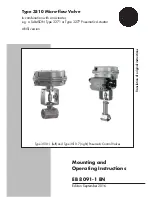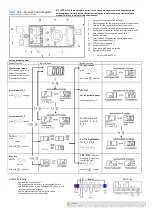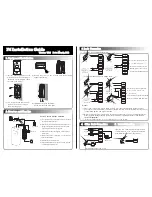
5-26
|
ni.com
Chapter 5
Counters
•
Continuous Buffered Implicit Pulse Train Generation
•
Finite Buffered Sample Clocked Pulse Train Generation
•
Continuous Buffered Sample Clocked Pulse Train Generation
Finite Pulse Train Generation
This function generates a train of pulses with programmable frequency and duty cycle for a
predetermined number of pulses. With cDAQ controller counters, the primary counter generates
the specified pulse train and the embedded counter counts the pulses generated by the primary
counter. When the embedded counter reaches the specified tick count, it generates a trigger that
stops the primary counter generation.
Figure 5-28.
Finite Pulse Train Generation: Four Ticks Initial Delay, Four Pulses
Retriggerable Pulse or Pulse Train Generation
The counter can output a single pulse or multiple pulses in response to each pulse on a hardware
Start Trigger signal. The generated pulses appear on the Counter
n
Internal Output signal of the
counter.
You can route the Start Trigger signal to the Gate input of the counter. You can specify a delay
from the Start Trigger to the beginning of each pulse. You also can specify the pulse width. The
delay and pulse width are measured in terms of a number of active edges of the Source input.
The initial delay can be applied to only the first trigger or to all triggers using the
CO.EnableInitialDelayOnRetrigger
property. The default for a single pulse is True, while the
default for finite pulse trains is False.
The counter ignores the Gate input while a pulse generation is in progress. After the pulse
generation is finished, the counter waits for another Start Trigger signal to begin another pulse
generation. For retriggered pulse generation, pause triggers are not allowed since the pause
trigger also uses the gate input.
Figure 5-29 shows a generation of two pulses with a pulse delay of five and a pulse width of
three (using the rising edge of Source) with
CO.EnableInitialDelayOnRetrigge
r set to the
default True.
En
ab
le
x
S
o
u
rce
Ctr
x
Co
u
nter Armed















































